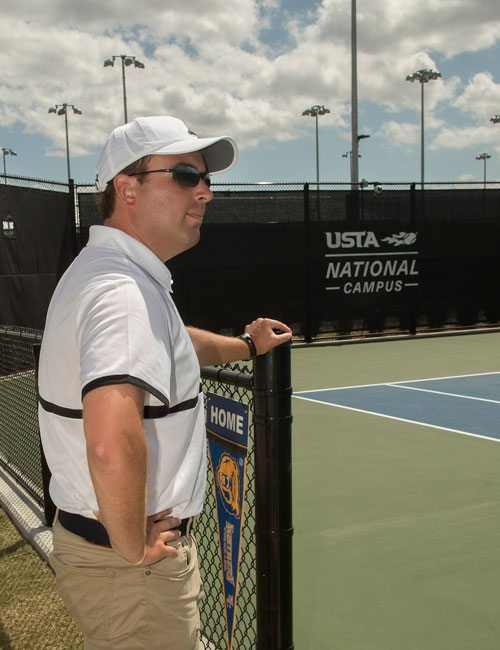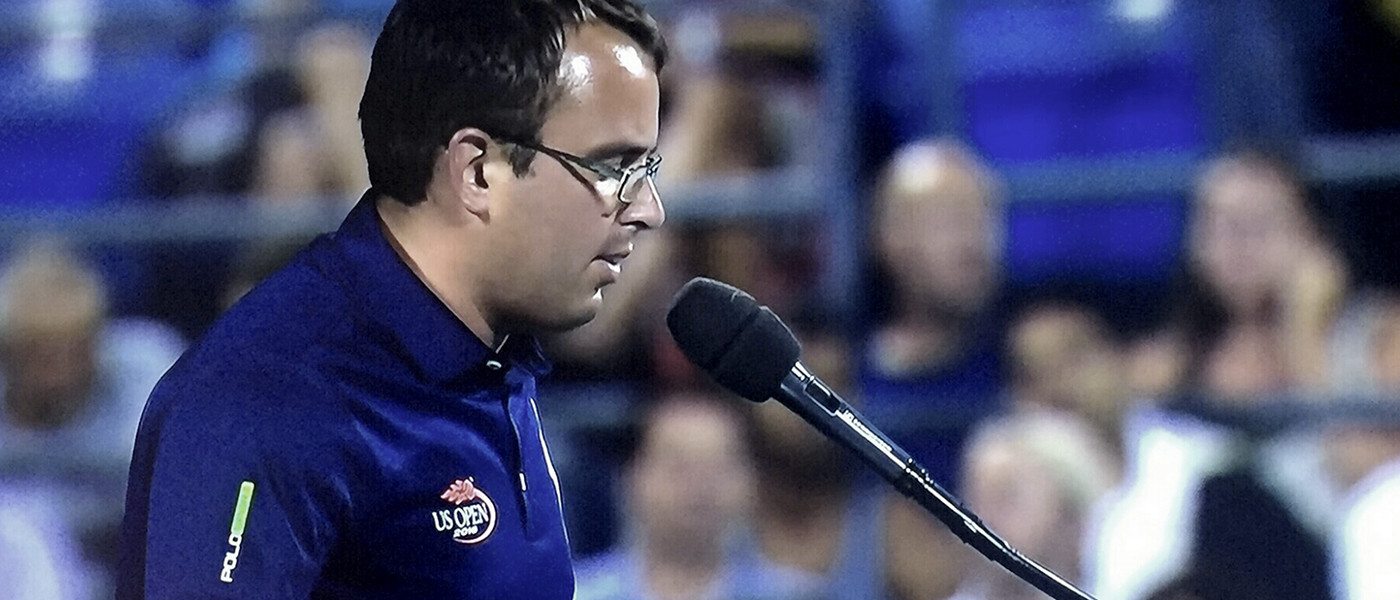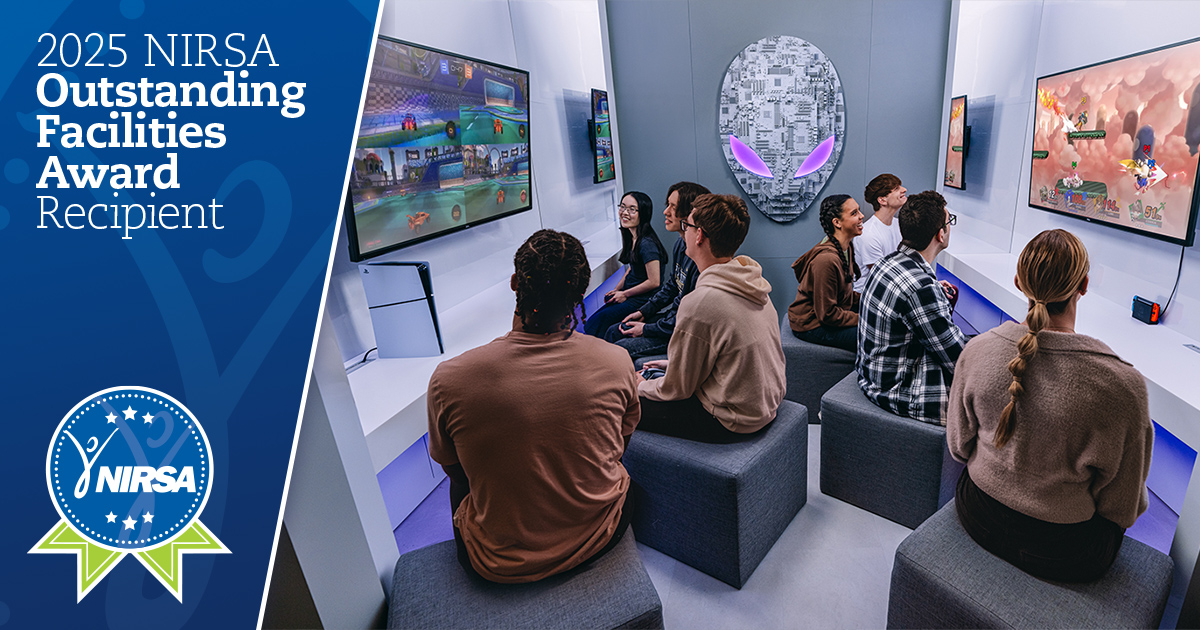Whether you’ve called a dodgeball match or raised the offside flag along the byline, if you’ve ever donned the black-and-white stripes, fired the starting gun, or had to judge a “minute to win it” game at the office, you know the pressure that comes with upholding the integrity of the game.
The fear of missing a big call or making the wrong call can be overwhelming for many aspiring sports professionals; like athletes, sports officials can become paralyzed by the pressure of the big moment.
Professional tennis umpire Greg Allensworth feels lucky that his courts have been relatively controversy-free over the years at elite-level matches in the U.S. and Australian Opens. But—not uncommon among up-and-coming professional officials across many sports—it was a controversial call he made while a student at Ohio University that helped him have the confidence to pursue a career as an official.
A tough call leads to a world of opportunities
In 2007, Greg was a young referee in a NIRSA Championship Series flag football semifinal matchup. Approaching the end of tight game, he made the call to whistle one of the teams for an unsportsmanlike conduct penalty. One of the participants spiked the ball in anger. Allensworth wasn’t even the closest official to the infraction. But he knew he had to throw his flag.
Recalling the transformative experience, Greg says, “I think we could have gotten away without giving it; but it was the right call, and the evaluators agreed it was a right call,” he said. “I stepped out of my zone a little, but, like I said, I feel like it was something that needed to be called. That was that moment that pushed me forward into pursuing sports officiating as a potential career path. That’s just one of those moments when I think I showed that I had the guts to be able to make a call at a critical time of the game.”
Greg says that while he didn’t enjoy making the decision, doing it and getting positive feedback about it made him comfortable as an official. It gave him an “inner swagger” something Greg says all officials have to have: “You’ve got to have the confidence to be able to do what you need to do to do the job. I think it proved to me that maybe I do have that.”
Today, Greg travels the world as a professional tennis umpire at the highest level. As a private contractor, he has significant autonomy when it comes to setting his schedule, and is qualified to officiate at events ranging from the NCAA Championships to Wimbledon.
A former competitive tennis player, Greg got his start in officiating because wanted to find a way to stay involved with sports after he suffered an injury. As an undergraduate at Ohio University, he took an elective football officiating class. One of the requirements of the course was to referee a handful of intramural games.
He enjoyed the experience so much that he stuck around the Campus Recreation Department at Ohio University even after he finished that course and quickly found mentors—including Matt Barnes, the then student director of officials at Ohio University and NIRSA member Nick Brigati, Assistant Director for Competitive Sports and Student Development at Ohio University—to foster his development.
“The great thing about officiating in rec sports is there are a lot of people in the campus recreation world who officiate at a high level,” Greg says. Campus recreation professionals in general and NIRSA members especially also have a long tradition of being capable and willing mentors.

A rising star
In 2007, Greg was named a NIRSA Flag Football All-American—making him one of seven from Ohio University to have ever earned the honor. Before he graduated in 2010 with his degree in history, he served as president of Ohio University’s Student Officials Association.
His professional work has continued to be recognized as his career has progressed. He was named the recipient of the 2010 Jack Stahr Award, which the United States Tennis Association awards in recognition of hard work, professionalism, technical ability and cooperative attitude both on and off the court. It is presented annually to an umpire within his or her first three years at the U.S. Open.
2016 was Greg’s most memorable year of his young professional career though, because he completed the “Golden Slam”—officiating in all four major tennis tournaments and the Olympics. “That was a pretty special achievement I’ll remember for a while,” he says.
He said thanks to his experience within Ohio’s campus recreation program and his experience officiating at the NIRSA tournaments, he honed his communication skills and learned to interact with many different personalities, from coaches to athletes to fellow officials.
The biggest lesson he learned—one that transcends officiating or the tennis world—is all about the importance of being prepared when presented with an opportunity. “An opportunity may come and you’ve got to jump on it,” he says. “You may only get that one opportunity, so you have to show you’re capable.”
Greg worked this spring as the head official at the NIRSA and USTA Tennis On Campus National Championships. In addition to giving Greg the opportunity to work for NIRSA, which is still an important organization to him, he also has another important reason for taking on that assignment—the opportunity to mentor and give back.
“I’ve always liked what NIRSA has done with their flag football and basketball championships, using student officials and developing them through those programs,” Greg says. “I’ve always thought there was something for that in tennis. When NIRSA and the USTA approached me, I asked who are you going to use as officials. They said ‘We’ve got to use some veteran officials.’ But then they also said, ‘and we’re going to use some students as well.’ At that point, I said ‘Sign me up. I’m in.’ I want to be able to help the college kids get their foot in the door in officiating. That’s what I’m happy about.”
NIRSA is a leader in providing opportunities for developing student sports officials
The NIRSA student officials’ development program has provided opportunities for hundreds of young aspiring and emerging sports officials over the past 20 years, continually raising the bar for college and officials training.
NIRSA’s program has a long history of serving as a high-quality source of well-trained officials. This training provides a grassroots solution to the shortage of young officials from the community and local levels, all the way up to the elite levels of college, and professional competition.
Through in-game training experiences, students learn to make real-time calls while shadowing experts. Students learn to officiate across multiple sports, as well as develop expert command of the rules and regulations in a specific sport.
Through the tutelage of NIRSA volunteers, students build skills like conflict resolution, communications, problem-solving and decision-making. Young officials who participate in NIRSA’s training become lifelong sports fans who give back to their communities on and off the field.
NIRSA’s training provides young officials with the experience they need to contribute meaningfully in their communities.
Support experiences like Greg’s by contributing to the NIRSA Foundation
With your help, NIRSA will continue to provide training to another generation of students who officiate in community, college, and even professional settings. Please help the next generation of sports officials to earn their stripes by making a tax-deductible gift to NIRSA’s Student Officials Development program today.
For those who have already earned their stripes, Darci Doll, Associate Director of Intramural Sports at The University of Texas at Austin and NIRSA member, challenges all current officials to join her in donating the equivalent amount of one game’s check from your highest level of officiating to NIRSA’s Student Officials Development Campaign.
Your donation shows your appreciation for the value and impact of officials’ training to both athletes and communities. NIRSA is committed to making the right call and maintaining the quality and value of its student officials’ development.
- For more information, please contact NIRSA Director of Philanthropy Kim Holmes.
- If you’re interested in highlighting a sports officials’ story from your campus or an alumni official’s achievements from your campus, pitch us your ideas.
Andy Seeley is the President of AS Communications. He can be reached at ascommunications@publicist.com.







